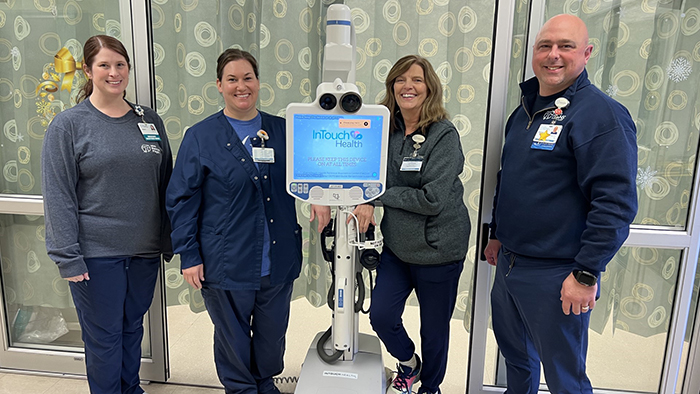St. Joseph's receives re-designation as an Acute Stroke Ready Hospital
January 16, 2024
HSHS St. Joseph’s Hospital Highland was recently re-designated as an Acute Stroke Ready Hospital by the Illinois Department of Public Health (IDPH). IDPH identifies hospitals capable of providing emergent stroke care and directs EMS providers to transport possible acute stroke patients to these hospitals.
Patrick Small, emergency department manager, shared, “We are proud to have received this re-designation which recognizes that our emergency stroke care policies and procedures are aligned with nationally recognized, evidence-based standards and criteria. Our emergency department is able to immediately, and appropriately, respond to stroke patients when they arrive,” Small explained. “Having this high-level re-designation reaffirms our commitment to provide exceptional emergency care to area residents.”
Outlined criteria to receive the Acute Stroke Ready designation includes developing and adhering to written emergency stroke protocols and the ability, 24 hours a day, 365 days a year, to provide all the following:
Act FAST
HSHS St. Joseph’s Hospital Highland joins with the American Heart Association and American Stroke Association in suggesting everyone remember the letters in FAST to spot stroke signs and know when to call 9-1-1.
Photo Caption: (Left to right) HSHS St. Joseph’s Hospital Highland emergency department RN’s Alyson and Colleen; Carol Lowery, team lead; and Patrick Small, emergency department manager, with the telemedicine cart and monitor used by St. Joseph’s Hospital to help rapidly diagnose stroke patients by connecting with a tele-neurologist for examination.
Patrick Small, emergency department manager, shared, “We are proud to have received this re-designation which recognizes that our emergency stroke care policies and procedures are aligned with nationally recognized, evidence-based standards and criteria. Our emergency department is able to immediately, and appropriately, respond to stroke patients when they arrive,” Small explained. “Having this high-level re-designation reaffirms our commitment to provide exceptional emergency care to area residents.”
Outlined criteria to receive the Acute Stroke Ready designation includes developing and adhering to written emergency stroke protocols and the ability, 24 hours a day, 365 days a year, to provide all the following:
- Brain image testing (CT scans)
- Blood coagulation studies
- Use of Tenecteplase (TNK) medicine to break up or dissolve blood clots (if appropriate)
Act FAST
HSHS St. Joseph’s Hospital Highland joins with the American Heart Association and American Stroke Association in suggesting everyone remember the letters in FAST to spot stroke signs and know when to call 9-1-1.
- F - Face drooping: Ask the person to smile. Does one side of the face droop or is it numb?
- A - Arm weakness: Is one arm weak or numb? Ask the person to raise both arms. Does one arm drift downward?
- S - Speech difficulty: Is speech slurred, are they unable to speak, or are they hard to understand? Ask the person to repeat a simple sentence like, “The sky is blue.” Is the sentence repeated correctly?
- T - Time to call 9-1-1: If the person shows any of these symptoms, even if the symptoms go away, call 9-1-1 and get them to the hospital immediately.
Photo Caption: (Left to right) HSHS St. Joseph’s Hospital Highland emergency department RN’s Alyson and Colleen; Carol Lowery, team lead; and Patrick Small, emergency department manager, with the telemedicine cart and monitor used by St. Joseph’s Hospital to help rapidly diagnose stroke patients by connecting with a tele-neurologist for examination.

Media Contact
Micalli Muschinske
Communications & Public Relations Specialist